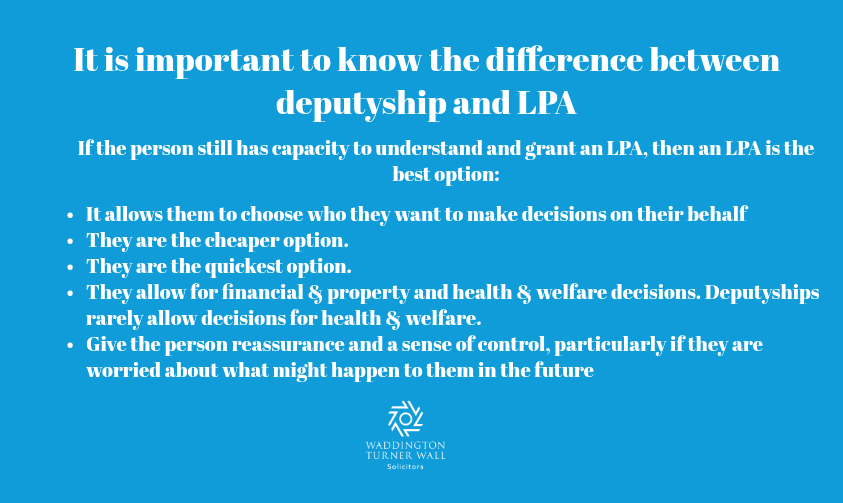Deputyship
A deputyship refers to the legal process of making decisions for someone who through age, ill health, dementia, injury or disability is unable to do so and is unable to grant a Lasting Power of Attorney (LPA). Please note that someone may lack mental capacity on a temporary basis or only at certain times, depending on their illness or disability.
If you need to act as a deputy, you must be authorised by the Court of Protection.
Property and Affairs Deputyship
This is the most common type of deputyship. It is used to manage a person's financial affairs where they do not have the ability (known as 'mental capacity') to do this for themselves.
The Court of Protection is unlikely to grant a deputyship if an attorney has already been appointed via a Power of Attorney.
If a person's only income is from benefits i.e. they do not have savings or property, then these will be managed by an 'appointee'. The appointee is authorised by the Department for Work and Pensions (DWP).
Personal Welfare Deputyship
It is rare for deputyships to be granted in relation to personal welfare. However, where there is a concern or disagreement in relation to the person's care or treatment, or the decision relates to serious medical treatment, then the court may intervene.
The Court of Protection is unlikley to appoint deputies to make ongoing decisions about someone's health and welfare unless their is a need for regular treatment and ongoing supervision.
It is very important to understand and consider the duties and responsibilities of being a deputy.
- Deputies must be 18 or over.
- They are usually close relatives or friends of the person who needs assistance.
- You need to have the skills to make financial decisions for someone else, if applying for a property and affairs deputyship.
The court can appoint two or more deputies for the same person. Decisions will be either:
- Together (‘joint deputyship’), which means the deputies must agree the decisions.
- Separately or together (‘jointly and severally’), which means deputies can make decisions independently or together.
As a deputy, you have a duty to:
- Always act in the person's best interests.
- Act with 'duty of care' i.e. appropriate care and skill.
- Uphold your 'fiduciary duty' i.e. to act with integrity.
- You cannot delegate your duties to a third party, unless authorised to do so in the court order.
- Deal with matters in a confidential manner.
- Act in good faith.
- Comply with any orders or directions of the Court of Protection.
In relation to a property and affairs deputyship, you have a duty to:
- Keep accurate accounts.
- Keep the person's money and property separate i.e. separate bank accounts.
Further useful information can be found on the UK Government's website in relation to the Mental Capacity Act 2005, Court of Protection and becoming a deputy.
Deputyship - Important to know
As a deputy you should consider the person's mental ability or capacity every time a decision needs to be made. It is important that appropriate support is offered to enble the person to make the decision themselves, whenever possible.
Each deputyship granted will be different. The court may place financial limits on individual transacations or how much can be spent in any given time period e.g. a week. The court may cancel a deputyship at any time if it is deemed that it is no longer in the person's best interest.
A deputy cannot:
- Make a decision for someone who is capable of making a decision for themselves.
- Overturn a decision made under an existing power of attorney.
- Refuse treatment or care to sustain a person's life, where the person lacks capacity to agree to this.
- Assume that every decision will be the same every time.
How to become a Deputy
In order to become a deputy an application with supporting evidence must be submitted to the Court of Protection. The documentation needs provide suffient information to enable the court to make a decision.
We tend to be instructed to act as the Court of Protection cannot offer legal advice. In some cases the legal fees can be paid using the person's funds, if the court agrees. The court fees are available on their website.
Documents:
- Main Application (COP1).
- Supporting information for property and affairs, if applicable (COP1A).
- Supporting information for personal welfare, if applicable (COP1B).
- Permission of the Court to Apply, if applicable (COP2).
- Capacity Assesssment (COP3).
- Deputy's Declaration (COP4).
- Witness Statement (COP24).
The court will assess the application and contact the person concerned, any family and/or friends. The application process can take some time, anywhere from a number of weeks to months. There are a several factors that can impact the time taken including:
- How many applications the court is assessing.
- The complexity of the application.
- Applications for personal welfare often take longer to assess.
- How much information is contained in the application and supporting documentation.
Security Bond
The Court of Protection requires all deputy's for property and financial affairs to ensure that there is a 'security bond' in place. The bond is a type of insurance that financially protects the person in case their finances are mismanaged. The size of the bond is entirely dependent on the value of any property and money held.
Guidance on security bonds is provided by the court. They will need the insurance to be in place before the deputyship order is sent out. The premium needs to be paid annually for as long as the order is in place.
Who needs to know?
Once the deputyship order has been received, the following should be advised (if applicable):
- Banks and building societies.
- Pension companies.
- Investment companies.
- Accountants.
- Solicitors (who holds the will and/or property deeds).
- Residential/nursing home.
- Department for Work and Pensions (DWP) e.g. pensions, benefits.
- Local Authority e.g. housing benefit, assistance with care home fees.
- Carers.
- Relatives.
- Friends.
Supervision
The Office of the Public Guardian (OPG) looks after the administrative side of deputyships. They supervise, provide evidence to the Court of Protection and information to the public. In terms of a deputyship, they are responsible for ensuring that the deputy keeps to the terms of the order, that any decisions comply with the Mental Capacity Act, and are in the person's best interest. Support from the OPG may include telephone calls and home visits. The cost of the support is included in the supervision fees.
There are two levels of supervision:
- General - All new deputies are placed on this as they may need additional support.
- Minimal - If the person's assets are below a certain limit and there are no concerns about the deputy.
Deputyship Supervision Fees
The supervision fees are payable annually. The amount will depend on the level of supervision.
Every year the deputy needs to provide a report to the Court of Protection. This should provide enough information so that the court can see the decisions made e.g. summary accounts for approval, care arrangements and bank statements, if you are a property and affairs deputy.
The Office of the Public Guardian (OPG) can offer guidance on what the deputy needs to provide. The deputy can also register for the online reporting service.
The report will be reviewed and the deputy contacted if any further information or clarification is needed.
Where an emergency application is needed, click on the link below:
Our legal team specialise in successfully dealing with a wide variety of matters including wills, deputyships, estate management, Powers of Attorney and trust administration; from initial advice through to completion.
Expertise and experience
With over 60 years experience between them the expertise and advice that the team offer:
- can simplify and shorten the legal process,
- provide you with a realistic assessment of your situation,
- as well as providing you with the comfort of knowing that all the legal requirements and issues will be managed professionally.
Wills, Probate & Later Life Planning Team
Initial Enquiry
We would be delighted to explain how we can help you. To speak to one of our team:















